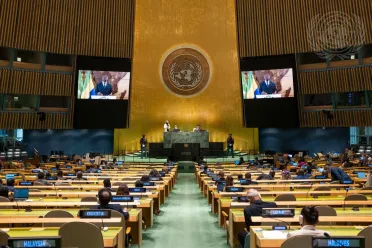Statement
Statement summary
ALI BONGO ONDIMBA, President of Gabon, said that efforts to end the pandemic are an opportunity for the world to overcome other major crises and think differently about development models. Indeed, some developed countries intend to relocate their strategic production assistance to reduce external dependency. Africa followed suit, he said. However, that will require African countries to build basic infrastructure, train quality human capital, invest in health infrastructure and break the cycle of dependence on primary raw materials. Economies must industrialize to create more wealth by taking advantage of human and natural resources. Moreover, African countries must accelerate the digital transition and learn lessons from the pandemic to rebuild societies in a more sustainable manner.
Turning to climate security, he observed that the impacts of climate change interplay with the socioeconomic and political issues in countries, highlighting risks like political instability, food insecurity and large-scale migration. States must adapt to face those challenges and the international political agenda will require a significant increase in resources to help States adapt to climate change. International cooperation is essential to support local action. The link between climate change and insecurity is obvious, he said.
He went on to call for a more just international order, marked by the reform of the Security Council so it is more broadly representative. The revitalization of the work of the General Assembly and Economic and Social Council must also be carried out, as they have crucial impacts on States’ abilities to achieve the several of the Sustainable Development Goals by 2030. Rebuilding government models requires the international community to meet its commitments, including the transfer of clean technologies so countries can transition to low‑carbon industries. Upholding those commitments is key to support countries like Gabon, which has mobilized resources on projects to promote climate security.
Gabon has been hit hard by the drop in commodity prices which has led to slowed economic activity, he continued. As such, he has instructed his Government to accelerate the transition to a post‑oil paradigm and emphasize new engines of growth, including the mining, forestry and agricultural sectors, as well as new solar and hydroelectric power plants. Beyond infrastructure development, it will ensure fiscal adjustment and promote the private sector, he reported. Inclusion is the thrust of the equal opportunity policy his Government promotes, and Gabon has one of the highest numbers of women working in Government in Africa. Gender parity is a matter of social justice, he stressed, adding that a country must be able to identify the talents and skills of its people without gender distinction.
However, development is not sustainable without peace and stability, he went on, calling for a comprehensive and united approach in fighting instability in several regions in Africa. A threat against one nation is a threat against all, he stressed. Security sector reform in the Central African Republic must be supported with a goal to restore State authority and ensure the security of the people there. The efforts of the Central African authorities to strengthen social cohesion should also be supported, he said, calling on donors to provide financing to ensure stability.
Full statement
Read the full statement, in PDF format.
Photo

Previous sessions
Access the statements from previous sessions.
